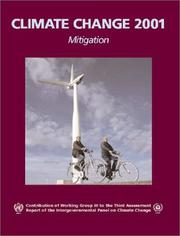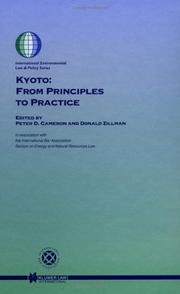| Listing 1 - 4 of 4 |
Sort by
|

ISBN: 0691120269 0691088705 9786613379832 1400824060 128337983X 1400814774 9780691120263 9781400814770 9781400824069 9780691088709 1400818508 Year: 2001 Publisher: Princeton, N.J. Princeton University Press
Abstract | Keywords | Export | Availability | Bookmark
 Loading...
Loading...Choose an application
- Reference Manager
- EndNote
- RefWorks (Direct export to RefWorks)
Even as the evidence of global warming mounts, the international response to this serious threat is coming unraveled. The United States has formally withdrawn from the 1997 Kyoto Protocol; other key nations are facing difficulty in meeting their Kyoto commitments; and developing countries face no limit on their emissions of the gases that cause global warming. In this clear and cogent book-reissued in paperback with an afterword that comments on recent events--David Victor explains why the Kyoto Protocol was never likely to become an effective legal instrument. He explores how its collapse offers opportunities to establish a more realistic alternative. Global warming continues to dominate environmental news as legislatures worldwide grapple with the process of ratification of the December 1997 Kyoto Protocol. The collapse of the November 2000 conference at the Hague showed clearly how difficult it will be to bring the Kyoto treaty into force. Yet most politicians, policymakers, and analysts hailed it as a vital first step in slowing greenhouse warming. David Victor was not among them. Kyoto's fatal flaw, Victor argues, is that it can work only if emissions trading works. The Protocol requires industrialized nations to reduce their emissions of greenhouse gases to specific targets. Crucially, the Protocol also provides for so-called "emissions trading," whereby nations could offset the need for rapid cuts in their own emissions by buying emissions credits from other countries. But starting this trading system would require creating emission permits worth two trillion dollars--the largest single invention of assets by voluntary international treaty in world history. Even if it were politically possible to distribute such astronomical sums, the Protocol does not provide for adequate monitoring and enforcement of these new property rights. Nor does it offer an achievable plan for allocating new permits, which would be essential if the system were expanded to include developing countries. The collapse of the Kyoto Protocol--which Victor views as inevitable--will provide the political space to rethink strategy. Better alternatives would focus on policies that control emissions, such as emission taxes. Though economically sensible, however, a pure tax approach is impossible to monitor in practice. Thus, the author proposes a hybrid in which governments set targets for both emission quantities and tax levels. This offers the important advantages of both emission trading and taxes without the debilitating drawbacks of each. Individuals at all levels of environmental science, economics, public policy, and politics-from students to professionals--and anyone else hoping to participate in the debate over how to slow global warming will want to read this book.
-Greenhouse gas mitigation --- -Abatement of greenhouse gas emissions --- Pollution prevention --- Warming, Global --- Global temperature changes --- Jingdu tiao yue --- Jingdu xie yi shu --- Jingdu yi ding shu --- Konvensi Perubahan Iklim --- Kyōto giteisho --- Kyoto Protocol --- Kyoto Treaty --- Lian he guo qi hou bian hua kuang jia gong yue de Jingdu yi ding shu --- Protokol Kyoto --- Protokol Kyoto Untuk Konvensi Kerangka Kerja PBB Tentang Perubahan Iklim --- 京都协议书 --- 京都条约 --- 京都議定書 --- 京都议定书 --- 联合国气候变化框架公约的京都议定书 --- Greenhouse gas mitigation --- Global warming --- Abatement of greenhouse gas emissions --- Emission reduction, Greenhouse gas --- Emissions reduction, Greenhouse gas --- GHG mitigation --- Greenhouse gas abatement --- Greenhouse gas emission reduction --- Greenhouse gas emissions reduction --- Greenhouse gas reduction --- Mitigation of greenhouse gas emissions --- Reduction of greenhouse gas emissions --- Government policy. --- United Nations Framework Convention on Climate Change --- Environmental protection. Environmental technology --- Human ecology. Social biology --- Sociology of culture --- Government policy --- Réchauffement de la Terre --- Gaz à effet de serre --- Politique gouvernementale --- Réduction --- Global warming - Government policy --- Greenhouse gas mitigation - Government policy

ISBN: 0521807697 0521015022 9780521807692 9780521015028 Year: 2001 Publisher: Cambridge, U.K. ; New York : Cambridge University Press,
Abstract | Keywords | Export | Availability | Bookmark
 Loading...
Loading...Choose an application
- Reference Manager
- EndNote
- RefWorks (Direct export to RefWorks)
Climate Change 2001: Mitigation is the most comprehensive and up-to-date scientific, technical and economic assessment of options to mitigate climate change and their costs. The report: - Makes clear there are strong inter-linkages between climate change policy and policies towards sustainable development. - Assesses information on technological options to reduce greenhouse gas emissions or enhance their sinks. - Analyses technologies and practices available to achieve the targets of the Kyoto Protocol and stabilise atmospheric concentrations of greenhouse gases. - Evaluates barriers impeding implementation of these options and methods available to overcome them. - Summarises the economic literature on costs of climate change mitigation at global, regional and national levels. - Evaluates the other benefits that climate policy can deliver or the climate benefits of other socio-economic policies. - Assesses how this information can be used to support climate policy decision making, acknowledging various decision-making frameworks. This latest IPCC assessment will again form the standard scientific reference for all concerned with climate change and who want to be informed of ways to address this important global problem: including students and researchers in environmental and social sciences, and policymakers and analysts in governmental and non-governmental organisations and the private sector world-wide.
Meteorology. Climatology --- Climatic changes --- Greenhouse gas mitigation --- Climat --- Gaz à effet de serre --- Government policy --- Changements --- Politique gouvernementale --- Réduction --- Greenhouse gas mitigation. --- Government policy. --- 540 Luchtverontreiniging --- Broeikaseffect --- Basic Sciences. Meteorology --- Climatology --- Climatic Change --- Climatic Change. --- Gaz à effet de serre --- Réduction --- Abatement of greenhouse gas emissions --- Emission reduction, Greenhouse gas --- Emissions reduction, Greenhouse gas --- GHG mitigation --- Greenhouse gas abatement --- Greenhouse gas emission reduction --- Greenhouse gas emissions reduction --- Greenhouse gas reduction --- Mitigation of greenhouse gas emissions --- Reduction of greenhouse gas emissions --- Pollution prevention --- Greenhouse gases --- Environmental aspects --- Climatic changes - Government policy. --- CLIMATIC CHANGES --- GREENHOUSE GAS MITIGATION --- GREENHOUSE EFFECT --- PUBLIC POLICY --- GOVERNMENT POLICY

ISBN: 9041116893 9789041116895 Year: 2001 Volume: 60 Publisher: London : Kluwer Law International,
Abstract | Keywords | Export | Availability | Bookmark
 Loading...
Loading...Choose an application
- Reference Manager
- EndNote
- RefWorks (Direct export to RefWorks)
Air --- Environmental law, International. --- Global warming --- Greenhouse gas mitigation --- Pollution --- Law and legislation. --- International cooperation. --- -Environmental law, International --- -Greenhouse gas mitigation --- -540 Luchtverontreiniging --- Broeikaseffect --- Abatement of greenhouse gas emissions --- Emission reduction, Greenhouse gas --- Emissions reduction, Greenhouse gas --- GHG mitigation --- Greenhouse gas abatement --- Greenhouse gas emission reduction --- Greenhouse gas emissions reduction --- Greenhouse gas reduction --- Mitigation of greenhouse gas emissions --- Reduction of greenhouse gas emissions --- Pollution prevention --- Warming, Global --- Global temperature changes --- Greenhouse effect, Atmospheric --- International environmental law --- International law --- Common heritage of mankind (International law) --- Atmosphere --- -Law and legislation --- Law and legislation --- International cooperation --- Environmental aspects --- Environmental law, International --- 540 Luchtverontreiniging --- Pollution&delete& --- United Nations Framework Convention on Climate Change --- Environmental law --- Liability for air pollution damages --- Air - Pollution - Law and legislation. --- Global warming - Law and legislation. --- Greenhouse gas mitigation - International cooperation.

ISBN: 9781451935097 1451935099 1589060008 9781589060005 1462349242 9781462349241 1452795762 9781452795768 Year: 2001 Publisher: Washington, D.C. : International Monetary Fund,
Abstract | Keywords | Export | Availability | Bookmark
 Loading...
Loading...Choose an application
- Reference Manager
- EndNote
- RefWorks (Direct export to RefWorks)
Explores different ways of controlling pollution through -green-taxes or permits, and evaluates their advantages and disadvantages. While many countries use environmental taxes, interest in tradable permits is growing.
Emissions trading --- Environmental impact charges --- Greenhouse gas mitigation --- Abatement of greenhouse gas emissions --- Emission reduction, Greenhouse gas --- Emissions reduction, Greenhouse gas --- GHG mitigation --- Greenhouse gas abatement --- Greenhouse gas emission reduction --- Greenhouse gas emissions reduction --- Greenhouse gas reduction --- Mitigation of greenhouse gas emissions --- Reduction of greenhouse gas emissions --- Pollution prevention --- Eco-taxes --- Ecological taxes --- Ecotaxes --- Effluent charges --- Environmental exploitation charges --- Environmental impact fees --- Environmental taxes --- Green taxes --- Pollution charges --- User charges --- Air --- Emissions credit trading --- Emissions rights trading --- Marketable permits for carbon dioxide emissions --- Tradeable emission permits --- Trading emissions credits --- Environmental policy --- Carbon offsetting --- Carbon taxes --- Economic aspects --- Government policy --- Pollution --- E-books --- 330.05 --- 333.9 --- 336.22 --- 351.777 --- 351.777 Wetgeving, reglementering i.v.m. milieubeheer, milieuhygiene, verontreiniging. Milieurecht. Milieuhygienerecht--zie ook {?502/504}; {?613/614}; {628} --- Wetgeving, reglementering i.v.m. milieubeheer, milieuhygiene, verontreiniging. Milieurecht. Milieuhygienerecht--zie ook {?502/504}; {?613/614}; {628} --- Indirekte belastingen: verbruiksbelasting. Accijnzen. Milieubelasting. Weeldebelasting --- Government policy. --- 336.22 Indirekte belastingen: verbruiksbelasting. Accijnzen. Milieubelasting. Weeldebelasting --- Economic History --- Business & Economics --- Taxation --- Environmental Economics --- Environmental Conservation and Protection --- Taxation and Subsidies: Externalities --- Redistributive Effects --- Environmental Taxes and Subsidies --- Climate --- Natural Disasters and Their Management --- Global Warming --- Environmental Economics: General --- Public finance & taxation --- Climate change --- Environmental economics --- Greenhouse gas emissions --- Environment --- Carbon tax --- Taxes --- Greenhouse gases --- Environmental sciences --- United States
| Listing 1 - 4 of 4 |
Sort by
|

 Search
Search Feedback
Feedback About
About Help
Help News
News